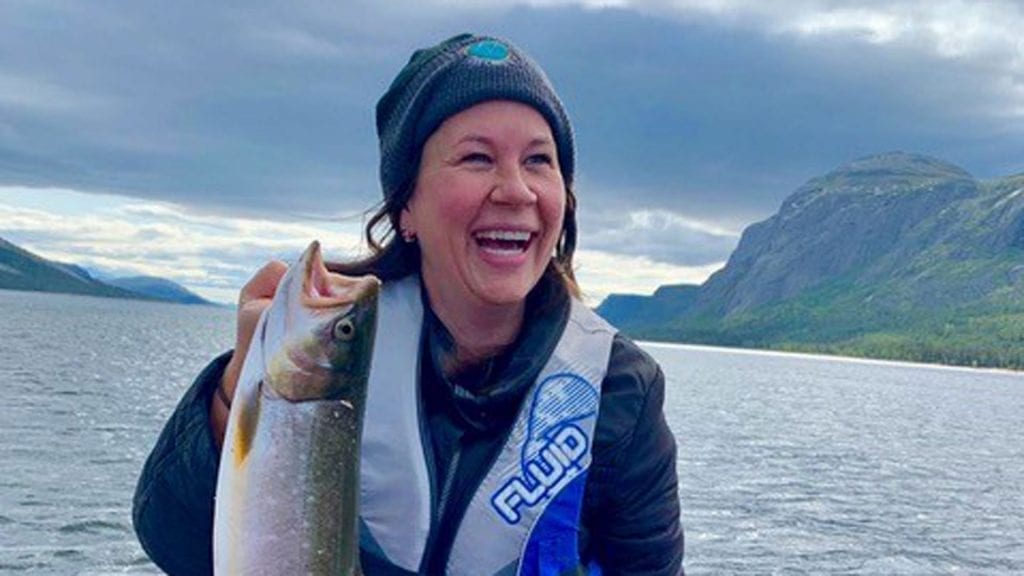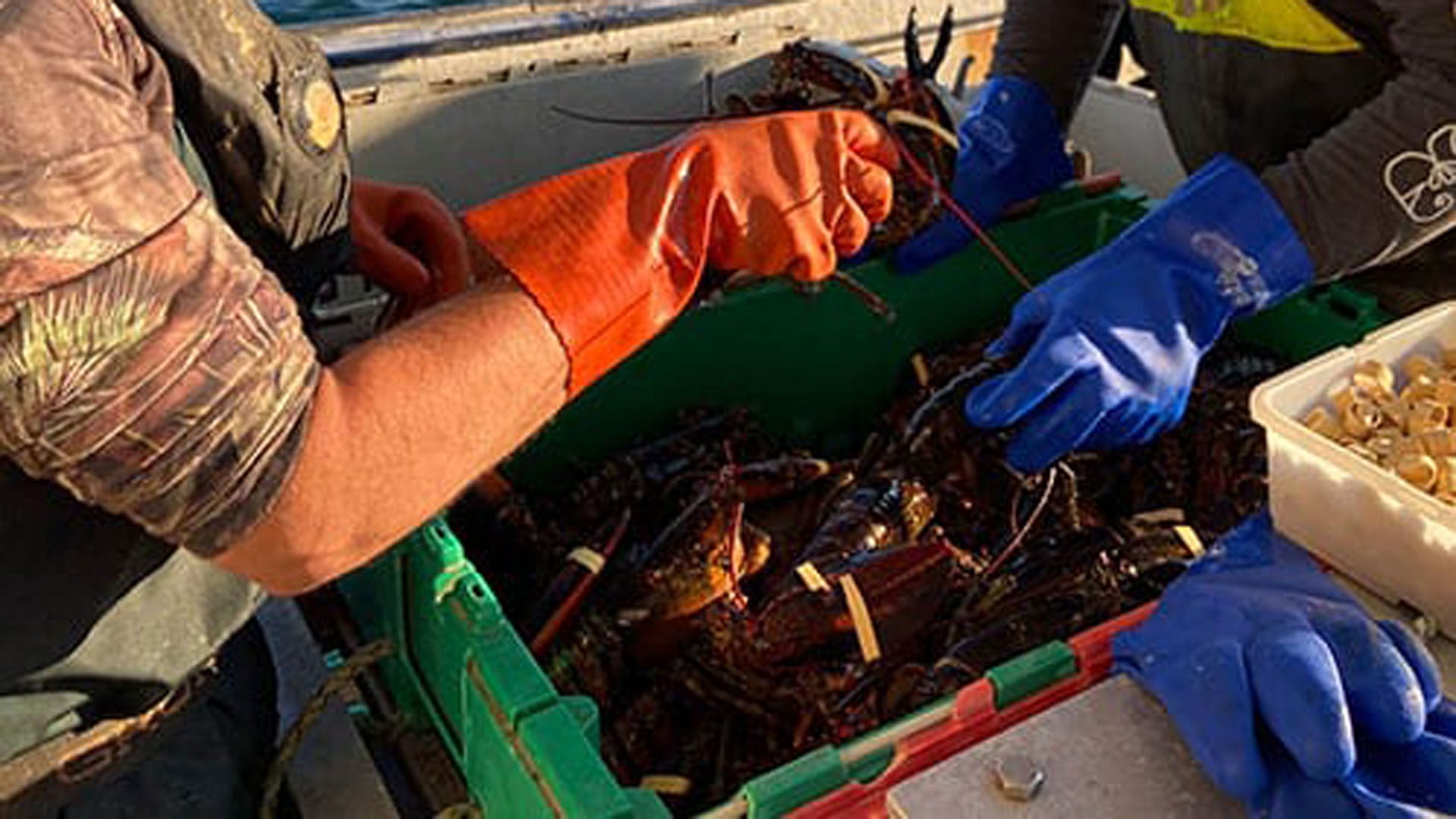
Megan Bailey, seen here char fishing in Nunatsiavut, says "the livelihood fishery is not a concern" to lobster sustainability right now. Photo submitted by Megan Bailey
The Mi’kmaw moderate livelihood lobster fishery at the heart of a contentious fishing rights dispute in southwest Nova Scotia poses no threat to conservation of the crustacean in the area, according to an expert at Dalhousie University in Halifax.
“The scale of the current effort in the livelihood fishery is not a danger to the lobster stocks,” Prof. Megan Bailey told APTN News. “That’s really clear. There’s no science that would dispute the small catch.”
Bailey, a Canada research chair in integrated ocean and coastal governance, received backlash from commercial fishers – several of whom emailed her to explain their concerns – after she made her point in the media last week.
Those protesting the Mi’kmaw fishing effort contend, among other things, that the fishery is illegal because it operates outside of Department of Fisheries and Oceans’s designated commercial season for that area. They say fishing lobster in the summer can be harmful and that year-round fishing in any one area is unsustainable.
Angel Moore has the latest from Nova Scotia as negotiations continue to implement the moderate livelihood fishery management plan.
Bailey explains that no fishery is inherently sustainable or unsustainable and that it’s up to DFO to come up with a regulatory regime that balances the demands of industry with the court-affirmed Mi’kmaw treaty right to fish.
“I think it’s all misinformation,” said Bailey. “I think what it really showcases to me though is how hard it is to sit and have a conversation about lobster sustainability when there are so many legacies of misinformation and distrust.”
Dalhousie’s biology department also publicly supports the Mi’kmaq and agrees that arguments based on conservation are unfounded.
“We denounce, in the strongest possible terms, the acts of violence perpetrated by anyone against Mi’kmaw harvesters pursuing their rights, and likewise denounce any claim that such actions are justified in the name of conservation,” said the department in a Sept. 24 statement.
“There is no credibility on biological grounds to the conservation concerns, given the terms of the fishery initiated by the Mi’kmaw community.”
Nova Scotia’s waters are parceled into several different lobster fishing areas, or LFAs. Sipekne’katik First Nation launched its fishery on the Saulnierville wharf, about three hours west of Halifax, in LFA 34 on Sept. 17.
LFA 34 is the province’s largest lobster fishing zone in terms of commercial licences, with 979 issued as of December 2018. Sipekne’katik’s fishery has issued seven licences for a total of 350 traps, with only three of those licences being fished presently. DFO says stocks are healthy.
“I think it’s important to recognize that if there’s too much effort or there’s too many lobsters coming out, then the question is who’s supposed to bear that burden, right? And I don’t think it’s Mi’kmaw fishermen,” Bailey explained.
“I actually think the commercial fishermen would be better off not crying conservation issues right now, because I think that could come back to bite them and it might limit their own take.”

Those who oppose the Mi’kmaw fishery also contend that lobsters are vulnerable during the summer because their shells soften as they molt in order to mate, which raises conservation concerns.
Bailey agreed that “we have seasons for a reason,” but she explained these reasons are more for lobster quality and a lack of market for soft-shell lobsters than an inherent threat to their health. She says the market prizes and charges more for hard-shell lobsters which are obtained after the molting season.
“In other jurisdictions with the same species and similar oceanic conditions, they have a fishery all year,” said Bailey. “In Maine for example, you can harvest lobsters all year round, and there’s a market for soft-shell lobster.”
According to DFO, “seeded” or egg-bearing female lobsters carry fertilized eggs on the underside of their tails for 10-12 months before releasing them.
Government rules are that undersized or egg-bearing lobsters have to be thrown back whenever they’re caught – rules the First Nation says its fishery follows.
Other communities are planning to launch their own livelihood fisheries, something DFO needs to turn its attention to now in order to avoid future friction, says Bailey.
“This is a much bigger issue that is going to have ramifications for lobster fishermen all across the Maritimes and the Gulf region,” she said. “It has to get solved and it has to get solved now or this is going to play out in wharfs across the Maritimes.”
Read more:
Fishery standoff continues: Mi’kmaw-owned boats, gear vandalized
Mi’kmaq lobster boats surrounded by Acadian commercial fishing vessels as traps are stolen, cut
Mi’kmaq have been pushing for this since the Supreme Court of Canada’s 1999 Marshall ruling that affirmed the right to fish stemming from treaties signed in the 18th century.
In part as a response to the 1999-2002 conflict over fishing rights in Esgenoôpetitj First Nation, also known as Burnt Church, the government introduced the Marshall Response Initiative which cut a piece off the commercial fishery for Mi’kmaw fishers but didn’t implement Marshall.
Mi’kmaw lawyer and Dalhousie law Prof. Naiomi Metallic told APTN the nation eventually launched a court case in 2013 after years of fruitless talks with Ottawa.
After seeking to quash the action, Ottawa offered again to come to the table.
“And that’s what they did. We put the case aside, and that’s where they’ve been for seven years and nothing has happened,” said Metallic.
“I don’t know why they’ve [the governmnent’s] been dragging their feet this long. The rule of law thing gets thrown around a lot – but they’re not implementing the law. They haven’t been implementing the law since 1999.”
Opposition MPs have raised this issue multiple times since the House of Commons resumed sitting last week.
On Monday, Conservative MP Chris D’Entrement accused the Liberals of failing to take charge of the situation and asked when they plan to resolve it.
“As I’ve said from the beginning of this crisis in Nova Scotia, our main priority is keeping people safe. To that end, I believe that the path forward is through honest, respectful and collaborative dialogue,” replied Fisheries Minister Bernadette Jordan.
“I have met with both First Nations and industry partners over the last number of weeks to find that path forward. We are committed to making sure that we implement the treaty rights that are guaranteed to the First Nations under the Marshall decision.”









